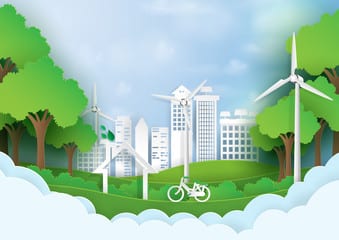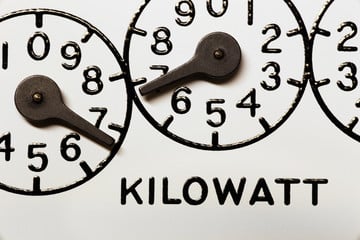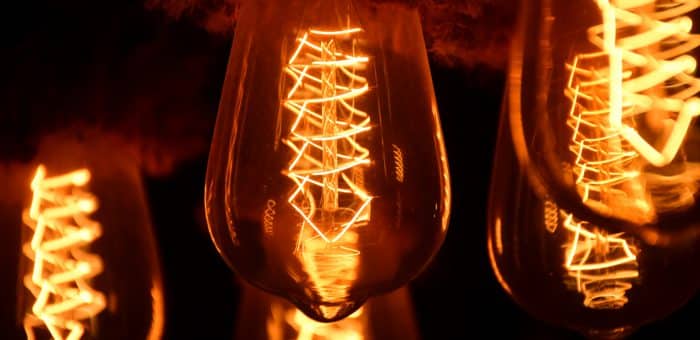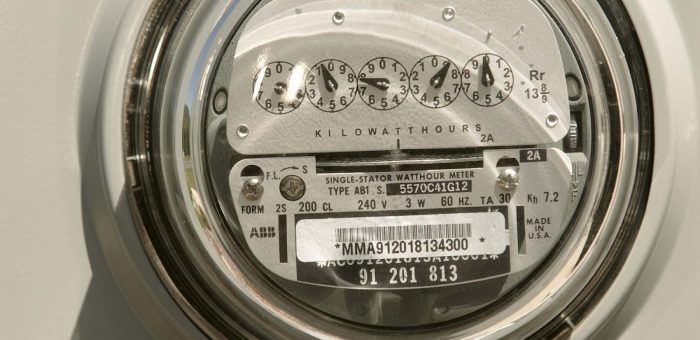A lot of people use the terms electricity and energy interchangeably, especially when referring to the utility bill you pay each month. When it comes to this bill, they are referring to the same thing, after all…
In this helpful guide, we will discuss the similarities and differences between these terms while also helping you discover the best available electricity plan for your energy needs.
Click on a section to skip directly to it:
What Is Electricity?
Electricity is the presence and flow of electric charge (electrons) in one direction.
It is a form of energy used to power our lives.
An electric current is when electrons move along a path, called a conductor.
When electrical charges are not moving, electricity is called static electricity.
Are you getting flashbacks of middle school science class yet?
Don’t worry. There is no need to study, and there won’t be a test later.
In the next section, we will explain electricity in simple, easy-to-understand terms. Keep reading to learn about the differences between static electricity and current electricity.
Forms of Electricity
What are the different forms of electricity?
There are two forms of electricity: Static and Current.
Wait. Isn’t solar, wind, nuclear, and natural gas also forms of electricity?
No, these are different types of electricity which we will discuss in a later section.
Static Electricity
You shuffle across the floor in socks, then reach out to turn on a light just to get zapped. That is static electricity.
We all have felt the jolt of a static electric shock. But what is static electricity, and why do we get shocked?
Static electricity is the increase of electric charge on the surface of objects.
This is the result of an imbalance between negative and positive charges.
Here are three ways static electricity can be harnessed and used:
- Printers and Copiers: Static electric charges attract ink to paper.
- Spray Paint: The paint droplets hold a negative charge as it leaves the nozzle and creates a mist.
- Air Filters: Static electricity traps airborne particles.
Discover the best electricity rates.
Power Wizard finds you the best electricity plan and ensures you won’t overpay for electricity again.
Learn More in Under 2 MinsCurrent Electricity
Current electricity is electrons in motion along a path. The path may be a conductor such as copper, silver, and aluminum. Free electrons can be forced to move from one region of the conductor to the other.
Current is the rate at which an electric charge flows in a conductor.
Current electricity is used to power everything in your home, from the front porch light to the air conditioning unit.
This type of electricity is necessary to power our world, and we use it every day in almost every activity we do.
So, is there a difference between electricity and energy?
Yes, there is a difference:
Electricity, also known as current, is the movement of charged particles through a wire or other medium.
Energy is the ability to do work or apply force to move an object.
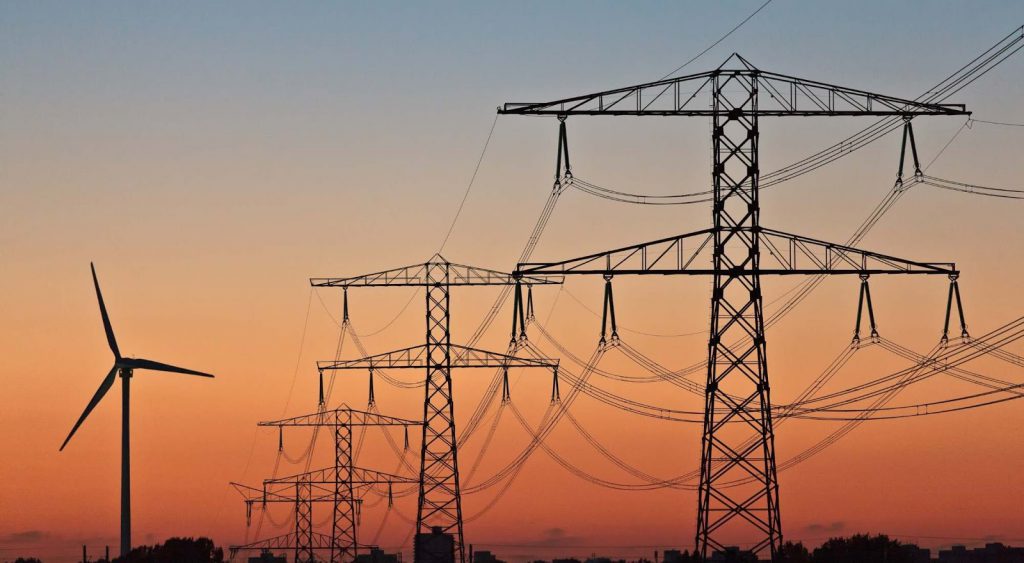
What Is Energy?
In the most basic terms, Energy is the work that a certain force can do. It can be divided into two categories: kinetic energy and potential energy.
Kinetic energy is the energy of motion. Potential energy is mechanical energy, stored energy, or energy caused by its position.
Energy comes in several forms:
- Gravitational
- Electrical
- Thermal (Heat)
- Chemical
- Nuclear
- Radiant (Solar)
- Light
- Motion
- Sound
So, how do energy and electricity work together?
Kilowatt-hour (kWh) is a measurement of energy that is equivalent to 1,000 watts of power for a 1 hour time period. Electricity usage is measured in kWh.
Your electric meter records the amount of electricity you use each month in kilowatt hours.
One kilowatt-hour = 1,000 watt-hours. If you turn on a 100-watt light bulb for 10 hours, the energy usage is calculated as 100 watts x 10 = 1,000 watts (or 1 kilowatt-hour).
If your current electricity rate is 11.0¢ per kWh, you will pay 11.0¢ for using a light bulb for 10 hours.
<h2id=”what-kind-of-energy-do-i-need-for-my-home”>What Kind Of Energy Do I Need For My Home?
Enough of the science lesson.
You want to know what kind of energy you need for your home.
We talked a little bit about the different types of energy above, but let’s talk more about it now.

Electricity For My Home
When you think of powering your home, electricity is probably the first energy source you think of.
Electric power is produced by power generators. Then the power is purchased by Retail Electric Providers (REPs), then sold to you for consumption.
Gas For My Home
Natural gas generates electricity when fossil fuels are burned in a boiler to heat water and produce steam. That steam turns a turbine to generate electricity.
Gas power is an example of thermal energy.
Solar For My Home
Solar power is the conversion of energy from sunlight into electricity.
This is done using photovoltaics (PV), indirectly using concentrated solar power or a combination.
Concentrated solar power systems use lenses or mirrors and solar tracking systems to focus a large area of sunlight into a small beam.
Photovoltaic cells convert light into an electric current using the photovoltaic effect.
Wind For My Home
If you have ever driven through central Texas, you have no doubt seen fields of large white windmills called wind turbines. These create Wind Energy.
Wind energy is the use of wind to provide mechanical power through wind turbines to turn electric generators.
Electricity Vs. Gas
Now that you understand the differences between electricity and gas, you want to know which one is the best source of energy for your home.
Let’s look at some of the pros and cons of each energy source:
| Electricity Pros | Gas Pros |
|---|---|
| Powers everything in your home | Fewer greenhouse gases |
| Electric appliances are cheaper | Rates are typically lower |
| Electricity Cons | Gas Cons |
|---|---|
| Less environmentally friendly | Limited uses – can’t power lights |
| Possible electric shocks | Gas/carbon monoxide leaks |
Determining whether electricity or gas is a better choice for your home depends on your individualized needs and personal choices.
While gas rates are often lower than electricity rates, gas may still cost you more in the long run.
If your home is equipped with all-electric appliances, converting to gas will be costly. You will have to pay to have gas lines put in. You will also have to purchase all new gas appliances.
Renewable Energy: Solar Vs. Wind
Since electricity and gas are generated by coal, nuclear, oil, and natural gas, they are considered nonrenewable. The resources for these types of energy are limited.
This is one reason renewable energy is so attractive. It is energy generated by resources such as the sun and wind, which are limitless.
Let’s look at a few pros and cons of solar and wind power:
| Solar Pros | Wind Pros |
|---|---|
| Produces no greenhouse gases | Low operational costs |
| Can power an entire house | High production potential |
| Solar Cons | Wind Cons |
|---|---|
| High initial costs | Fluctuating source-not always windy |
| Takes up lots of space | Threat to wildlife |
Solar and wind power both offer tremendous potential for 100% green energy. However, these sources of energy do have some setbacks.
The initial costs to fit your home with solar panels can range anywhere from $15,000 – $40,000. That is a huge amount of money.
Solar customers generally see a return on investment within 7 years of installation. This may be good if you don’t plan to move, but for those who move often, solar panels will not yield the same financial benefits.
Wind power seems to be a great option. It uses less energy and is capable of producing much more electricity.
The downside is that wind turbines are noisy. Additionally, they are a threat to wildlife due to deforestation and harmful to birds and bats.
Discover the best electricity rates.
Power Wizard finds you the best electricity plan and ensures you won’t overpay for electricity again.
Learn More in Under 2 MinsIs Electricity A Form Of Energy?
The short answer: No, energy and electricity are not the same.
Although energy and electricity tend to be used interchangeably, they are, in fact, different.
Electricity is produced by the movement of electrons. Electricity is converted to energy which is used to power your TV, heater, and dishwasher.
Energy is the ability to do work. It is the measurement of the force needed to move something. In the case of electricity, energy is the force that drives the electricity through lines and into your home.
Energy can be measured using many different units, but electricity is measured in kilowatts per hour.
How Is Electricity Produced?
The three major categories of energy used for electricity generation are
- Fossil fuels (coal, natural gas, and petroleum)
- Nuclear energy
- Renewable energy
Most electricity is generated with ([steam turbines] turbine) using fossil fuels, nuclear, biomass, geothermal, and solar thermal energy.
Other major electricity generation technologies include ([gas turbines] turbine plant), hydro turbines, wind turbines, and solar photovoltaics.
Once electricity is generated, it is sold in bulk to retail electric providers (REP). REPs then sell electricity to you, the consumer, at a rate per kWh.
In Conclusion
In conclusion, while electricity and energy are closely related, they are not the same. Understanding the difference between the two is crucial for making informed decisions about energy consumption and efficiency.
Electricity is essential for powering devices and systems, but it is just one way that energy manifests and is utilized in our daily lives. By recognizing the diverse forms of energy and the role electricity plays, we can better appreciate the complexities of the energy landscape and work towards more sustainable and efficient energy use.
More From the Power Wizard Blog
-
Green Energy vs. Fossil Fuels: A Cost Comparison
As global efforts to minimize fossil fuel emissions continue, green energy alternatives offer a potential long-term solution to the problem. Today, sustainable resources like wind and solar energy are becoming more prevalent as countries worldwide strive to meet net-zero objectives by 2050. But how does the cost of green energy compare to fossil fuel costs, and […]
View Article -
Common misconceptions about Texas electricity deregulation
Texas has a unique power grid that’s completely deregulated. Since it’s the only state with isolated electricity deregulation, many people don’t fully understand how it works, leading to many misconceptions about Texas power. Keep reading to unpack some of these misconceptions and learn why they aren’t a reality. What is Texas electricity deregulation? For people […]
View Article -
What Causes an Electricity Shortage?
The electricity that powers our homes can sometimes be taken for granted. You pay the electric bill, and everything inside your home is powered. This is possible, of course, thanks to electrical power plants generating electricity from fuel or other sources and transmitting that power across a vast electricity grid to your community and finally […]
View Article -
Why Have Electricity Prices Increased In Texas
Click on a section to skip directly to it: Texas electric rates risingDiscover the best electricity rates.Discover the best electricity rates.Why have electricity prices in Texas increased?Discover the best electricity rates.Discover the best electricity rates.Why are electric rates variable in Texas?Discover the best electricity rates.Choosing the best plan type for you You’re talking to a […]
View Article -
Penalty For Stealing Electricity In Texas
Click on a section to skip directly to it: Is Stealing Electricity A Crime?Discover the best electricity rates.How Do People Steal Electricity?What Happens If You Steal Electricity?Discover the best electricity rates.How to Know if Your Are A Victim of Electricity TheftReport suspected stolen energy If you’ve got a high electricity bill, someone could be stealing […]
View Article -
Retail Electric Choice
Click on a section to skip directly to it: Power Wizard Has The AnswersWhat Is Retail Electric Choice?Discover the best electricity rates.Discover the best electricity rates.Discover the best electricity rates.Discover the best electricity rates.What Is A Retail Electric Provider?Discover the best electricity rates.Texas Retail Choice: How To Choose the Best Retail Electric ProviderDiscover the best […]
View Article -
Should I Lock In My Electricity Rate
Click on a section to skip directly to it: What is a locked-in electric rate?Discover the best electricity rates.What electric plan offers a locked-in rate?Short-term vs. long-term locked-in electric ratesThings to consider when shopping for a locked-in electric rateHow to find the cheapest locked-in electric rates in Texas Shopping for an electric rate by yourself […]
View Article -
Texans For Affordable Electric Rates
Click on a section to skip directly to it: Skip the ads. Use the Shopping Tool now!Why Do Electric Rates Fluctuate In Texas?Discover the best electricity rates.Discover the best electricity rates.6 Ways Texans Can Promote Affordable Electric RatesDiscover the best electricity rates.Discover the best electricity rates.Discover the best electricity rates.Discover the best electricity rates. Do […]
View Article
